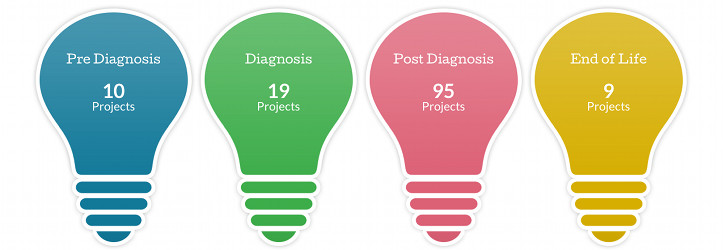
Conference details: 21 October 2015, Southampton, UK.
Report by: Angus Prosser, NIHR CLAHRC Wessex, University of Southampton.
On 21st October 2015, over 150 people from more than 70 organisations involved in dementia care from Hampshire, the Isle of Wight and Dorset in the UK braved grey skies and rain to attend the 2nd annual Dementia Collaboration Conference in Southampton. The conference aimed to share and showcase good practice and innovative work in dementia care across the region, in addition to identifying actions and potential collaboration projects to further improve the support provided to dementia patients and carers. The day was hosted by three organisations – The Wessex Academic Health Science Network, Public Health England, and the Wessex Mental Health, Dementia and Neurological Conditions Strategic Clinical Network.
After an introduction by Dr Christopher Kipps, Clinical Director for the Strategic Clinical Network, the day was opened with a personal account of dementia by Nicci Gerrard, co-founder of John’s Campaign. John’s Campaign is a campaign to allow the families and carers of people with dementia the same rights as parents of sick children: to have the right to remain with them in hospital for as long as they are needed. Nicci Gerrard highlighted how carer-support in hospital can contribute to patients’ well-being, and provide a level of attention that cannot be provided by clinical staff with time restraints. The presentation was followed by Alison McGinnes and Rachel Hayden, Clinical Nurse Specialists for long term conditions and dementia respectively, who spoke of their experience supporting John’s campaign at Hampshire Hospitals NHS Foundation Trust.
Elaine Rashbrook, Public Health England’s National Lead for Older People, provided a talk on dementia risk reduction, and how it is the ‘low hanging fruit’ in dementia – “at best it will do good, at worst it will do no harm”. Public Health England’s national dementia programme was discussed, as well as the ‘One You’ national social marketing campaign aimed at raising awareness of actions people can take to reduce their dementia risk. Heart well-being, mood, smoking, drinking and cognitive ability were highlighted as changeable factors which could reduce the risk of dementia and delay its onset.
Professor Alistair Burns, NHS England’s National Clinical Director for Dementia, presented a national dementia update that emphasised the importance of improving care across all stages of the dementia pathway, including some examples of guidelines and organisations looking at preventing well, diagnosing well, supporting well, living well and dying well. Professor Burns commended the delegates for their work across these areas.
Dr Christopher Kipps was welcomed back to the podium to officially launch the Wessex Dementia Timeline. The Wessex Dementia Timeline is a project that was developed as a visual display of dementia projects that are taking place in Wessex, with an aim to aid collaboration to improve dementia care. Dr Kipps explained that the Dementia Timeline contains over 130 projects, grouped into pre-diagnosis, diagnosis, post-diagnosis, and end of life projects. The Dementia Timeline can be viewed at http://wessexhealthlines.nhs.uk/
To round off an enjoyable and informative day on dementia care in and around Wessex, Dementia Timeline awards for projects of exceptional quality were presented. The award for the best pre-diagnosis project went to “The Journey of Dementia”, an interactive theatre experience run by James Wilson aimed at raising awareness of the family experience prior to receiving a diagnosis. The “Early Diagnosis Project Wiltshire 2012-2015”, which used volunteers to improve dementia knowledge at community locations to increase diagnosis rates, took away the award for the best diagnosis project. The “Dementia and Fire Safety Collaborative Working” project by the fire service and Southern Health’s older people’s mental health team won the post-diagnosis award for their work to reduce the risk of injury or death from fire in the home for those with dementia. The Dementia and Fire Safety and Collaborative Working project was also awarded the directors choice award by Professor Alistair Burns, who thought the project was an outstanding example of how collaborations can make a large impact in the care of people with dementia. The end of Life project award went to “End of Life care dementia training programme” by Jane Brennan, which sets out to train health and social care staff and carers of those with dementia on end of life care.
The conference provided multiple workshops throughout the day for delegates. These included interactive sessions on dementia risk reduction and prevention, utilisation of information using the Dementia Intelligence Network, workplace development for person and relationship centred dementia care, embedding dementia research into clinical practice, and creating dementia friendly environments in GP and acute care settings.
Posters on current research from pre-diagnostic to end of life care in dementia research were displayed, and dementia organisation exhibition stands showcased their work.
ACNR V15:Issue 6 Online 8/2/16